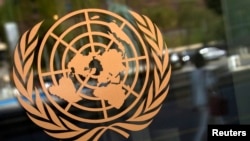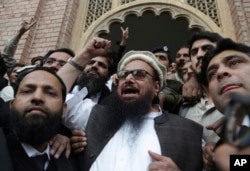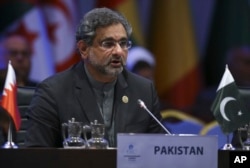A United Nations Security Council delegation is expected to visit Pakistan this week to monitor measures taken by the government against organizations listed on the U.N.'s terror watch list.
The U.N. sanctions committee will visit Islamabad on January 25 and 26 to talk with Pakistani military and civilian officials, a Pakistan government official told Dawn, the country's main English newspaper.
Member states are required to ensure that financial assets of terror groups are frozen and that they are barred from carrying out any terror activities.
The U.N. committee's visit to Pakistan comes at a time when the country is facing pressure because of its failure to prosecute Hafiz Saeed, the chief of Jamaat-ud-Dawa (JuD), a U.S.- and U.N.-designated terror group.
The U.N. delegation most likely will pressure Pakistan to move against Saeed, who is believed to be the alleged mastermind of the 2008 terror attacks in Mumbai that killed more than 160 people, including six Americans.
Following the Mumbai attacks, Saeed was added to the U.N. Security Council Resolution 1267 sanctions list in December 2008.
Despite being placed on the U.N. list, Saeed has had freedom of movement in Pakistan and was put under house arrest only in 2008, 2009 and 2017. The last house arrest lasted 11 months, before Pakistan's government cleared him of the charges.
Pakistani Prime Minister Shahid Khaqan Abbasi told the country's private television station, Geo TV, that Pakistan had not convicted Saeed of any charges because there was no evidence.
"There is no case against Hafiz Saeed in Pakistan. If there was a case, action would be taken. This is an issue that comes to the fore repeatedly, but there is no truth in it," Abbasi told Geo TV.
U.S. stance
Heather Nauert, spokeswoman for the U.S. State Department, reacted strongly to Abbasi's statement in her weekly press briefing, stressing the need for Pakistan to prosecute Saeed.
"We have made our points and our concerns to the Pakistani government very clear. We believe that he [Saeed] should be prosecuted to the fullest extent of the law," Nauert told reporters.
Prime Minister Abbasi told Reuters news agency that Pakistan will move against the charities that have ties to Saeed.
"Yes, the government will take over the charities which are sanctioned and not allowed to operate," Abbasi said Monday.
Some critics believe Pakistan's announcement, however, is simply meant to pacify the U.N. team before its upcoming visit.
"There are reports of Pakistan intentions to shut down a series of charities linked to LeT [Lashkar-e-Taiba], JuD in Pakistan — is that going to happen?" asked Michael Kugelman of The Wilson Center in Washington.
Kugelman added that even if the charities are closed, there will be future problems.
"Even if there is progress, I think you have to fear that you'll have a new type of charitable group or new organization that will come up very soon after that," he said.
Arif Jamal, a U.S.-based South Asia expert on terrorism, agreed with Kugelman's assessment, adding that many terror groups on the U.N. list are still operating freely in Pakistan.
"There are 27 organizations and about 38 individuals on UNSC sanctions list operating from Pakistan. JuD, TTP, LeJ, FIF, al-Qaida and Lashkar-e-Taiba are the well-known among them," Jamal said.
Routine visit
Pakistani government officials are downplaying the U.N. Security Council delegation's expected visit, calling it routine.
"The U.N. committee is most welcome to visit and observe Pakistan's commitment against terror organizations banned by the U.N. We will make sure to facilitate them as much as possible," Rana Sana Ullah, the Law Minister of Punjab province, told VOA.
"I am sure the U.N. body will notice our efforts and sacrifices. We have been implementing U.N. sanctions effectively," he added.
In addition to other terror groups and individuals, the United Nations list includes Falah-e-Insaniyat Foundation (FiF).
FiF is believed to be the front organization for JuD, and it collects funds under the guise of welfare for poor people. The U.S. has declared both JuD and FiF as terrorist organizations.
Saeed, who is based in the eastern city of Lahore, has reacted to the government's intentions of imposing a ban on his organizations and reportedly has filed a petition in a local court to bar the government from arresting him or taking any action against JuD or FiF.
Some experts, such as Kugelman, view the U.N. delegation visit as significant due to its timing. Pakistan is already under increasing pressure from the United States for not taking adequate action against terrorist groups operating on its soil and planning attacks from there against U.S.-led NATO forces in Afghanistan.
"The question is not what [the] U.N. will do ... but how [the] U.S. will use the conclusion by the U.N. team," Kugelman said.
Shahnaz Nafees from VOA Urdu contributed to this report.







